Unit 4 Why don't you talk to your parents?教案
- 格式:doc
- 大小:173.00 KB
- 文档页数:16
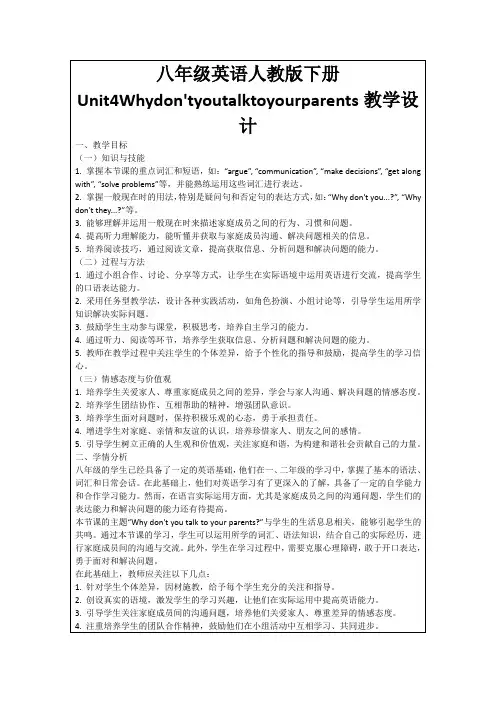
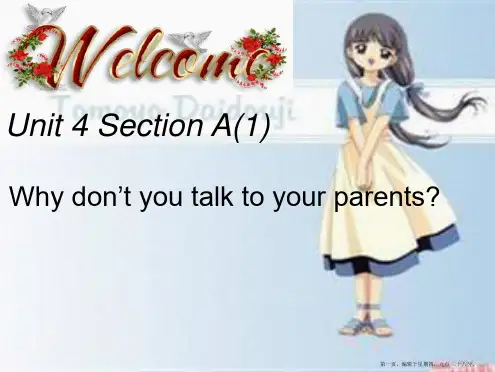
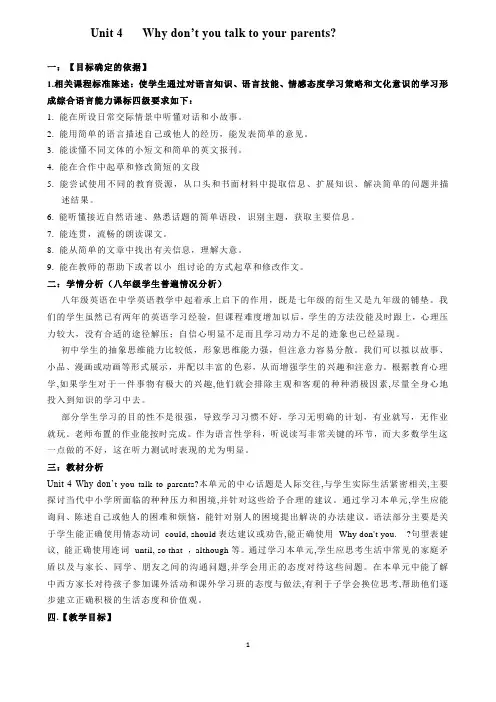
Unit 4 Why don’t you talk to your parents?一:【目标确定的依据】1.相关课程标准陈述:使学生通过对语言知识、语言技能、情感态度学习策略和文化意识的学习形成综合语言能力课标四级要求如下:1. 能在所设日常交际情景中听懂对话和小故事。
2. 能用简单的语言描述自己或他人的经历,能发表简单的意见。
3. 能读懂不同文体的小短文和简单的英文报刊。
4. 能在合作中起草和修改简短的文段5. 能尝试使用不同的教育资源,从口头和书面材料中提取信息、扩展知识、解决简单的问题并描述结果。
6.能听懂接近自然语速、熟悉话题的简单语段,识别主题,获取主要信息。
7. 能连贯,流畅的朗读课文。
8. 能从简单的文章中找出有关信息,理解大意。
9. 能在教师的帮助下或者以小组讨论的方式起草和修改作文。
二:学情分析(八年级学生普遍情况分析)八年级英语在中学英语教学中起着承上启下的作用,既是七年级的衍生又是九年级的铺垫。
我们的学生虽然已有两年的英语学习经验,但课程难度增加以后,学生的方法没能及时跟上,心理压力较大,没有合适的途径解压;自信心明显不足而且学习动力不足的迹象也已经显现。
初中学生的抽象思维能力比较低,形象思维能力强,但注意力容易分散。
我们可以拟以故事、小品、漫画或动画等形式展示,并配以丰富的色彩,从而增强学生的兴趣和注意力。
根据教育心理学,如果学生对于一件事物有极大的兴趣,他们就会排除主观和客观的种种消极因素,尽量全身心地投入到知识的学习中去。
部分学生学习的目的性不是很强,导致学习习惯不好,学习无明确的计划,有业就写,无作业就玩。
老师布置的作业能按时完成。
作为语言性学科,听说读写非常关键的环节,而大多数学生这一点做的不好,这在听力测试时表现的尤为明显。
三:教材分析Unit 4 Why don’t you talk to parents?本单元的中心话题是人际交往,与学生实际生活紧密相关,主要探讨当代中小学所面临的种种压力和困境,并针对这些给予合理的建议。

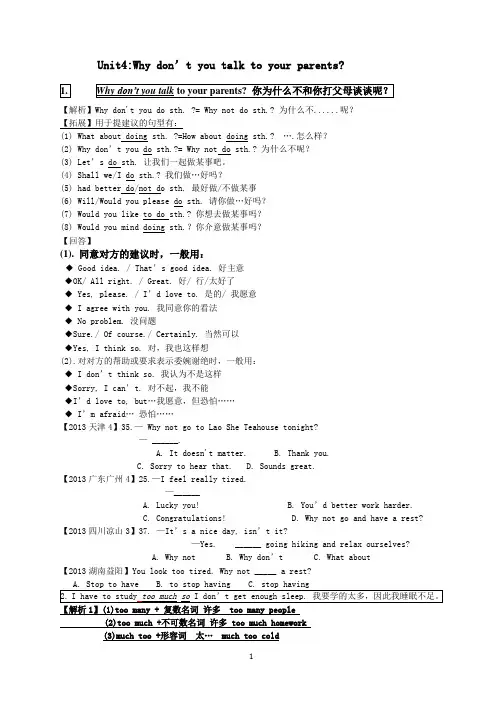
Unit4:Why don’t you talk to your parents?1.Why don’t you talk to your parents? 你为什么不和你打父母谈谈呢?【解析】Why don't you do sth. ?= Why not do sth.? 为什么不......呢?【拓展】用于提建议的句型有:(1) What about doing sth. ?=How about doing sth.? ….怎么样?(2) Why don’t you do sth.?= Why not do sth.? 为什么不呢?(3) Let’s do sth. 让我们一起做某事吧。
(4) Shall we/I do sth.? 我们做…好吗?(5) had better do/not do sth. 最好做/不做某事(6) Will/Would you please do sth. 请你做…好吗?(7) Would you like to do sth.? 你想去做某事吗?(8) Would you mind doing sth.?你介意做某事吗?【回答】(1). 同意对方的建议时,一般用:◆ Good idea. / That’s good idea. 好主意◆OK/ All right. / Great. 好/ 行/太好了◆ Yes, please. / I’d love to. 是的/ 我愿意◆ I agree with you. 我同意你的看法◆ No problem. 没问题◆Sure./ Of course./ Certainly. 当然可以◆Yes, I think so. 对,我也这样想(2).对对方的帮助或要求表示委婉谢绝时,一般用:◆ I don’t think so. 我认为不是这样◆Sorry, I can’t. 对不起,我不能◆I’d love to, but…我愿意,但恐怕……◆ I’m afraid…恐怕……【2013天津4】35.— Why not go to Lao She Teahouse tonight?— ______.A. It doesn't matter.B. Thank you.C. Sorry to hear that.D. Sounds great.【2013广东广州4】25.—I feel really tired.—______A. Lucky you!B. You’d better work harder.C. Congratulations!D. Why not go and have a rest?【2013四川凉山3】37. —It’s a nice day, isn’t it?—Yes. ______ going hiking and relax ourselves?A. Why notB. Why don’tC. What about【2013湖南益阳】You look too tired. Why not _____ a rest?A. Stop to haveB. to stop havingC. stop having2.I have to study too much so I don’t get enough sleep. 我要学的太多,因此我睡眠不足。
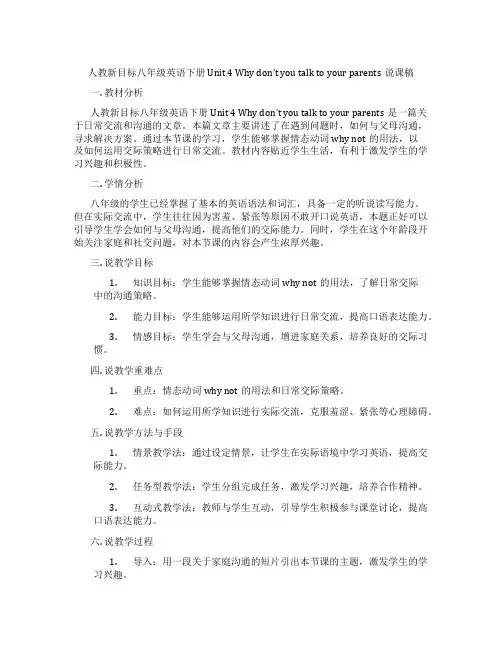
人教新目标八年级英语下册Unit 4 Why don’t you talk to your parents说课稿一. 教材分析人教新目标八年级英语下册Unit 4 Why don’t you talk to your parents是一篇关于日常交流和沟通的文章。
本篇文章主要讲述了在遇到问题时,如何与父母沟通,寻求解决方案。
通过本节课的学习,学生能够掌握情态动词why not的用法,以及如何运用交际策略进行日常交流。
教材内容贴近学生生活,有利于激发学生的学习兴趣和积极性。
二. 学情分析八年级的学生已经掌握了基本的英语语法和词汇,具备一定的听说读写能力。
但在实际交流中,学生往往因为害羞、紧张等原因不敢开口说英语,本题正好可以引导学生学会如何与父母沟通,提高他们的交际能力。
同时,学生在这个年龄段开始关注家庭和社交问题,对本节课的内容会产生浓厚兴趣。
三. 说教学目标1.知识目标:学生能够掌握情态动词why not的用法,了解日常交际中的沟通策略。
2.能力目标:学生能够运用所学知识进行日常交流,提高口语表达能力。
3.情感目标:学生学会与父母沟通,增进家庭关系,培养良好的交际习惯。
四. 说教学重难点1.重点:情态动词why not的用法和日常交际策略。
2.难点:如何运用所学知识进行实际交流,克服羞涩、紧张等心理障碍。
五. 说教学方法与手段1.情景教学法:通过设定情景,让学生在实际语境中学习英语,提高交际能力。
2.任务型教学法:学生分组完成任务,激发学习兴趣,培养合作精神。
3.互动式教学法:教师与学生互动,引导学生积极参与课堂讨论,提高口语表达能力。
六. 说教学过程1.导入:用一段关于家庭沟通的短片引出本节课的主题,激发学生的学习兴趣。
2.新课呈现:教师展示文章,引导学生关注文章标题和关键词,预测文章内容。
3.课堂讲解:教师讲解情态动词why not的用法和日常交际策略,让学生通过例句理解并掌握。
4.实践环节:学生分组进行角色扮演,运用所学知识进行实际交流,教师巡回指导。
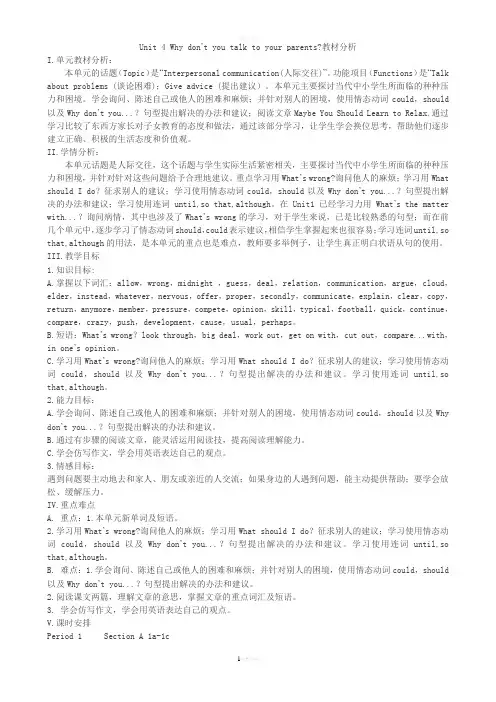
Unit 4 Why don’t you talk to your parents?教材分析I.单元教材分析:本单元的话题(Topic)是“Interpersonal communication(人际交往)”。
功能项目(Functions)是“Talk about problems (谈论困难);Give advice (提出建议)。
本单元主要探讨当代中小学生所面临的种种压力和困境。
学会询问、陈述自己或他人的困难和麻烦;并针对别人的困境,使用情态动词could,should 以及Why don’t you...?句型提出解决的办法和建议;阅读文章Maybe You Should Learn to Relax,通过学习比较了东西方家长对子女教育的态度和做法,通过该部分学习,让学生学会换位思考,帮助他们逐步建立正确、积极的生活态度和价值观。
II.学情分析:本单元话题是人际交往,这个话题与学生实际生活紧密相关,主要探讨当代中小学生所面临的种种压力和困境,并针对针对这些问题给予合理地建议。
重点学习用What’s wrong?询问他人的麻烦;学习用What should I do?征求别人的建议;学习使用情态动词could,should以及Why don’t you...?句型提出解决的办法和建议;学习使用连词until,so that,although。
在Unit1已经学习力用What’s the matter with...?询问病情,其中也涉及了What’s wrong的学习,对于学生来说,已是比较熟悉的句型;而在前几个单元中,逐步学习了情态动词should,could表示建议,相信学生掌握起来也很容易;学习连词until,so that,although的用法,是本单元的重点也是难点,教师要多举例子,让学生真正明白状语从句的使用。
III.教学目标1.知识目标:A.掌握以下词汇:allow,wrong,midnight ,guess,deal,relation,communication,argue,cloud,elder,instead,whatever,nervous,offer,proper,secondly,communicate,explain,clear,copy,return,anymore,member,pressure,compete,opinion,skill,typical,football,quick,continue,compare,crazy,push,development,cause,usual,perhaps。
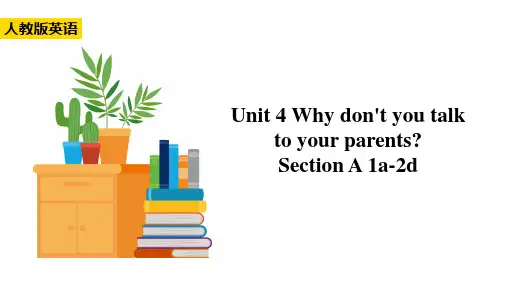
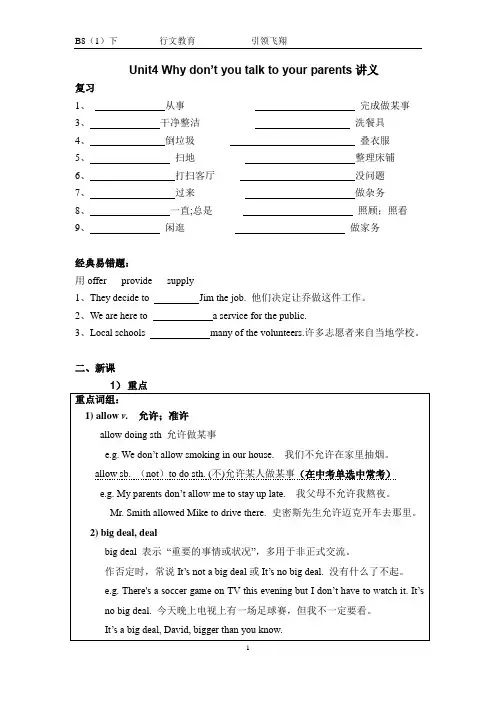
Unit4 Why don’t you talk to your parents讲义复习1、从事完成做某事3、干净整洁洗餐具4、倒垃圾叠衣服5、扫地整理床铺6、打扫客厅没问题7、过来做杂务8、一直;总是照顾;照看9、闲逛做家务经典易错题:用offer provide supply1、They decide to Jim the job. 他们决定让乔做这件工作。
2、We are here to a service for the public.3、Local schools many of the volunteers.许多志愿者来自当地学校。
二、新课例题一、根据句意及首字母提示完成单词1.His parents are very busy. They have little time to c with their children.2.You shouldn’t c my homework. You should do it alone.答案municate 2.copy.例二:单项填空1.His father doesn’t allow him swimming alone.A.goesB.to goC.goingD.go2.What’s with you?A.wrongB.the wrongC.matterD.up3. give him a watch?A.What aboutB.Let’sC.Why don’tD.Why don’t you4.You could save some money you can buy a gift for your mother.A.in order toB.becauseC.soD.so that5.I think the result must him very much.A.surpriseB.surprisedC.surprisingD.surprises答案:.1.B allow sb. to do sth.是固定搭配,意为“允许某人做某事”。
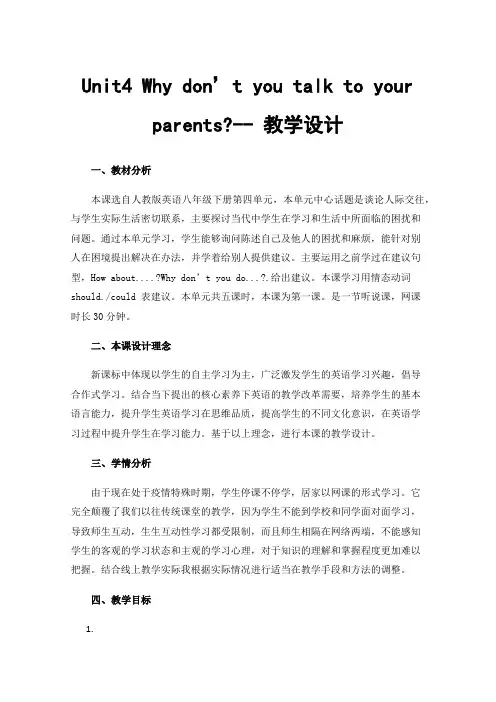
Unit4 Why don’t you talk to yourparents?-- 教学设计一、教材分析本课选自人教版英语八年级下册第四单元,本单元中心话题是谈论人际交往,与学生实际生活密切联系,主要探讨当代中学生在学习和生活中所面临的困扰和问题。
通过本单元学习,学生能够询问陈述自己及他人的困扰和麻烦,能针对别人在困境提出解决在办法,并学着给别人提供建议。
主要运用之前学过在建议句型,How about....?Why don’t you do...?.给出建议。
本课学习用情态动词should./could 表建议。
本单元共五课时,本课为第一课。
是一节听说课,网课时长30分钟。
二、本课设计理念新课标中体现以学生的自主学习为主,广泛激发学生的英语学习兴趣,倡导合作式学习。
结合当下提出的核心素养下英语的教学改革需要,培养学生的基本语言能力,提升学生英语学习在思维品质,提高学生的不同文化意识,在英语学习过程中提升学生在学习能力。
基于以上理念,进行本课的教学设计。
三、学情分析由于现在处于疫情特殊时期,学生停课不停学,居家以网课的形式学习。
它完全颠覆了我们以往传统课堂的教学,因为学生不能到学校和同学面对面学习,导致师生互动,生生互动性学习都受限制,而且师生相隔在网络两端,不能感知学生的客观的学习状态和主观的学习心理,对于知识的理解和掌握程度更加难以把握。
结合线上教学实际我根据实际情况进行适当在教学手段和方法的调整。
四、教学目标1.知识与技能。
掌握句型What’s wrong?You shold/could...Why don’tyou ...?2.过程与方法。
培养学生本话题听说能力的同时,培养学生英语思维品质。
3.情感态度与价值观。
通过小组合作,培养合作意识,鼓励学生大胆表达自己在苦恼,热情为别人提供建议,增强面对困难的为勇气,学会解决问题的方法。
五、教学重点难点掌握句型What’s wrong?You shold/could...Why don’t you ...询问别人在情况,然后给有困难的同学提供合理的建议是本课的重点。
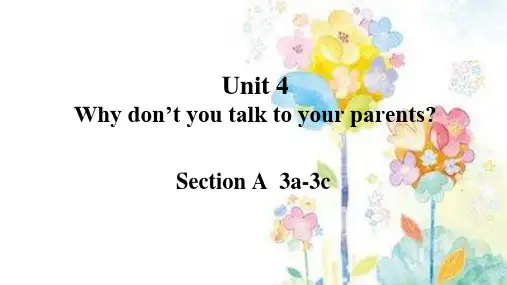
2019-2020学年人教版英语八年级下册Unit 4 Why don’t you talk to your parents?课文知识点总结Section A1.Why don’t you talk to your parents? 你为什么不和你打父母谈谈呢?【解析】Why don't you do sth ?= Why not do sth? 为什么不......呢?【拓展】用于提建议的句型有:(1)What about doing sth ?=How about doing sth? ….怎么样?(2)Why don’t you do sth?= Why not do sth? 为什么不呢?(3)Let’s do sth.让我们一起做某事吧。
(4)Shall we/I do sth?我们做…好吗?(5)had better do/not do sth 最好做/不做某事(6) Will/Would you please do sth 请你做…好吗?(7) Would you like to do sth? 你想去做某事吗?(8)Would you mind doing sth?你介意做某事吗?【回答】(1). 同意对方的建议时,一般用:◆Good idea./ That’s good idea. 好主意◆OK/ All right./ Great 好/ 行/太好了◆Yes, please ./ I’d love to 是的/ 我愿意◆I agree with you 我同意你的看法◆No problem 没问题◆Sure/ Of course/ Certainly 当然可以◆Yes, I think so 对,我也这样想(2).对对方的帮助或要求表示委婉谢绝时,一般用:◆I don’t think so 我认为不是这样◆Sorry, I can’t 对不起,我不能◆I’d love to, but…◆I’m afraid…我愿意,但恐怕……2.I have to study too much so I don’t get enough sleep.我要学的太多,因此我睡眠不足。
八年级英语下册Unit4Whydon’tyoutalktoyourparents?知识点整理八年级英语下册Unit4hydon’tyoutaltoyourparents?知识点整理hydon’tyoutaltoyourparents?你为什么不和你打父母谈谈呢?【解析】hydon'tyoudosth?=hynotdosth?为什么不......呢?【拓展】用于提建议的句型有:hataboutdoingsth?=Hoaboutdoingsth?….怎么样?hydon’tyoudosth?=hynotdosth?为什么不呢?Let’sdosth.让我们一起做某事吧。
Shalle/Idosth?我们做…好吗?hadbetterdo/notdosth最好做/不做某事ill/ouldyoupleasedosth请你做…好吗?ouldyoulietodosth?你想去做某事吗?ouldyouinddoingsth?你介意做某事吗?【回答】同意对方的建议时,一般用:◆Goodidea./That’sgoodidea.好主意◆o/Allright./Great好/行/太好了◆yes,please./I’dloveto是的/我愿意◆Iagreeithyou我同意你的看法◆Noproble没问题◆Sure/ofcourse/certainly当然可以◆yes,Ithinso对,我也这样想对对方的帮助或要求表示委婉谢绝时,一般用:◆Idon’tthinso我认为不是这样◆Sorry,Ican’t对不起,我不能◆I’dloveto,but…◆I’afraid…我愿意,但恐怕……【XX天津4】35.—hynotgotoLaoSheTeahousetonight?—______.A.Itdoesn'tatterB.Thanyouc.SorrytohearthatD.Soundsg reat【XX广东广州4】25.—Ifeelreallytired.—______A.Lucyyou!B.you’dbetterorharder.c.congratulations!D.hynotgoandhavea rest?【XX四川凉山3】37.—It’saniceday,isn’tit?—yes.______goinghiingandrelaxourselves?A.hynotB.hydon’tc.hatabout【XX湖南益阳】youlootootired.hynot_____arest?A.StoptohaveB.tostop havingc.stophavingIhavetostudytoouchsoIdon’tgetenoughsleep.我要学的太多,因此我睡眠不足。
Unit 4 Why don’t you talk to your parents?Section A 1 (1a-2d)课型听说与对话课时第一课时授课时间一、教学目标:1. 语言知识目标:1) 能掌握以下单词:allow, wrong, guess, deal, work out能掌握以下句型:①—What’s wrong?—I’m reall y tried because I studied until midnight last night.② You could give him a ticket to a ball game.③ I think you should ask your parents for some money.④ Why don’t you talk to him about it?2) 能了解以下语法:(1)能够运用所学知识谈论问题和困难、提出建议并做出选择;(2)能根据对方所提出的问题,给出一些合理的建议。
2. 情感态度价值观目标:培养学生良好的合作意识,鼓励学生大胆表达自己的想法和意愿。
正确认识生活中的一些困难,能采用正确的方式解决生活中的问题。
二、教学重难点1. 教学重点:1) Talk about the problems. 2) Learn the new language points.2. 教学难点:能根据对方所提出的问题,给出一些合理的建议。
学会表达建议的一些方式。
三教法学法听说法小组合作探究观察对比四教学用具课件听力材料音频五教学过程Step 1 Warming up1. 导入学生们平时在学校和生活中存在的问题。
T: What’s the matter/What’s wrong?S: He has too much homework to do.T: Do he like to do it?S1:No, he doesn’t. Because he doesn’t have any free time to do things he likes.…Step 2 Talking1. Look at these problems. Do you think they are serious or not? Ss discuss with their partners and give some advice.①I have to study too much so I don’t get enough sleep.②I have too much homework so I don’t have any free time to do things I like.③My parents don’t allow me t o hang out with my friends.④ I have too many after-school classes.⑤ I got into a fight with my best friend.Step 3 Listening1. T: Tell Ss to read the sentences in 1a again. Make sure they know the meaning of the sentences.2. Play the recording for the Ss to listen and circle the problems you hear in 1a.3. Play the recording again. Check the answers with the Ss.Step 4 Pair work1. Let Ss read the conversation in the box.2. Use the information in 1a to make other conversations.3. Let some pairs act out their conversations.e.g. A: What’s wrong?B: I’m really tied because I studied until midnight last night.A: Why don’t you go to sleep earlier this evening?4. Language points1) allow v. 允许;准许allow sb. (not) to do sth. (不)允许某人做某事e.g. My parents don’t allow me to stay up late. 我父母不允许我熬夜。
Mr. Smith allowed Mike to drive there. 史密斯先生允许迈克开车去那里。
2) wrong adj.错误的;不对的= not righte.g. Some words on the advertisement are wrong. 广告上的一些字错了。
Step 5 ListeningWork on 2a:T: Peter has some problems. What advice does his friend give him? Fill in the blanks with could or should.1. Let Ss read the sentences in 2a.2. Play the recording for the Ss to listen and write the words in the blank.3. Play the recording again to check the answers.Work on 2b:1. Let Ss read the sentences below. Explain some main sentences for the Ss. Make sure they know the meaning of each sentence.2. Play the recording for the Ss to write the letters (a-e) next to the advice in 2a.3. Play the recording again to check the answers.Answers: 1. d 2. e 3. a 4. c 5. bStep 6 Pair work1. Tell Ss to make a conversation using the information in 2a and 2b.2. Let one pair to read out their conversation first.3. e.g. A: What’s the matter, Peter?B: I had a fight with my best friend. What should I do?A: Well, you should call him so that you can say you’re sorry.B: But I don’t want to talk about it on the phone.4. Ss act the conversation in pairs. Ask some pairs to act out their conversations.Step 7 Role-play1. Ss read the conversations and try to understand the meaning.2. Read the conversation after the teacher.3. Practice the conversation with their partner. Then let some pairs to act out the conversation.4. Explain some new words and main points in the conversation.(1) guesse.g. Let us guess the height of the building.让我们来猜一下这个建筑物的高度。
(2) big deal, dealbig deal是英语中的一个固定搭配,表示“重要的事情或状况”,多用于非正式交流。
作否定用法时,常说It’s not a big deal或It’s no big deal.表示说话人并不认为某事有什么了不起。
e.g. There's a soccer game on TV this evening but I don’t have to watch it. It’s no big deal.今天晚上电视上有一场足球赛,但我不一定要看。
没什么大不了的。
It’s a big deal, David, bigger than you know.这事挺重要的,戴维,比你所知道的要重要。
What's the big deal? It’s only a birthday, not the end of the world.有什么了不起的?这不过是个生日,又不是世界某日。
(3) work outwork out 解决(问题);算出e.g. Mike worked out the difficult problem by himself.迈克自己算出了那道难题。
Is it possible to work out the problem? 有可能解决这个问题吗?六小结训练。
、(B)1.My teacher often gives me _______ on English study.A.some advices B.adviceC.some piece of advice D.some advice(A)2.Though I haven't seen my parents for a long time.I often write ________ them.A.to B.for C.at D.with(D)3.I saw a very funny movie _______ the computer yesterday.A.to B.for C.at D.on(C)4.—________ look up the words in a dictionary?—That's a good idea.A.Why not you B.Why don'tC.Why not D.What about(C)5.When I walked through the park,I found a boy ________ under a tree.A.cried B.cry C.crying D.cries七Homework:Write three conversations about your problems and your friends’ suggestions.A: I have too many after-school classes.What could I do?B: You could …八九教学反思Section A 2 (3a-3c)课型阅读理解课时第二课时授课时间一、教学目标:1. 语言知识目标:1) 学习掌握下列词汇:get on with; relation, communication, argue, cloud, elder, instead, whatever, nervous, offer, proper, secondly, communication, explain, clear2)阅读短文,能按要求找到相应的信息。